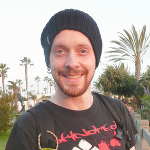Fellow Detail

| Name | Robert Paul Davey |
|---|---|
| Affiliation | The Genome Analysis Centre, UK |
| Research area code | (I1) Computer science |
| Fellowship Inauguration Year | 2016 |
| Short Biography | I joined TGAC in February 2010 as the lead software engineer on the MISO lab information management (LIMS) project, which was released to the community as an open source framework for tracking sequencing experiments in 2012. I went on to become Core Bioinformatics Project Leader, managing a team of developers to advance MISO as well as new projects into data infrastructure and management, and the genomic data visualisation tool, TGAC Browser. I was appointed as Data Infrastructure and Algorithms Group Leader in late 2012, and we focus on research into understanding how best to manage, represent and analyse data for open science, as well as exploring new hardware, algorithms and methodologies to develop tools to push the boundaries of data-driven informatics in the life sciences. The team applies their research expertise to develop infrastructure platforms for data and software dissemination and publication, assembly algorithms for viral and microbial metagenomics, large-scale data visualisation, and best practice and training in bioinformatics. Prior to joining TGAC, I was a post-doctoral researcher at the Institute of Food Research (IFR) in the National Collection of Yeast Cultures (NCYC) group, writing sequence analysis tools (TURNIP) and providing bioinformatics support to help drive this important national capability. Way back when, I completed my degree in Microbiology and my PhD in Bioinformatics at the University of East Anglia (UEA), the latter developing algorithms for assessing the gene content of bacterial organisms using Comparative Genomic Hybridisation microarrays. Looking to the present and into the future, my main interests are in practising and promoting enterprise-grade software development, data management and associated HPC infrastructure through projects like Galaxy and iPlant-UK, metadata and the Semantic Web, sequence analysis and quality control pipelines, novel visualisation strategies for large-scale biological data, the open source ethos, and advocacy of equality and openness in science. |
Previous events
| Title | Start date | End date |
|---|---|---|
| No event. | ||
Blog Posts
| Publish date | |
|---|---|
| Steps To Start Liberating Your Science | 16 Oct 2017 |